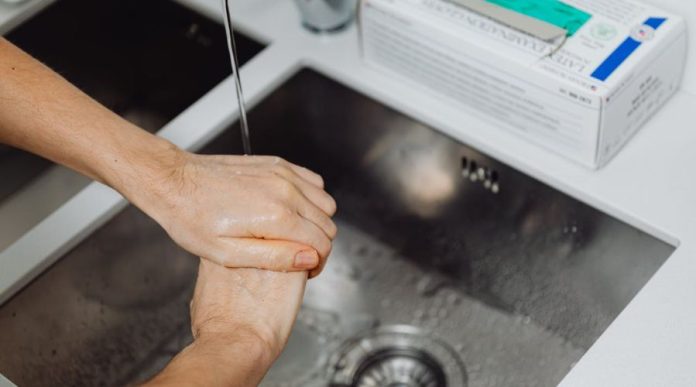Commonly considered a haven, hospitals can sometimes be where an infection is acquired. Whether it is a primary care, surgical, or emergency room visit, there may be a risk of pathogen exposure.
One metric that measures this phenomenon is a Hospital Acquired Infection (HAI).1 It’s a means of judging overall safety and compliance within healthcare facilities. The CDC estimates approximately 1.7 million patients have an HAI annually, and one in seventeen die from it.2
HAIs are infections acquired during the time in the hospital that had nothing to do with your reason for admission. These infections often develop shortly after discharge.2 The medical community perceives these as some of the worst infection types, labeling them antibiotic-resistant infections.
What is antibiotic resistance?
The World Health Organization recognizes antimicrobial resistance as pathogens evolving to evade treatment medications.3 The evasion is due to years of antibiotic misuse—for example, the prescribing of antibiotics for a common cold.
The problem is that many common illnesses, including colds, flu, and COVID-19, are viral—a virus is an entirely different organism than a bacteria and will not respond to an antibiotic for this infection.
The overuse of antibiotics has given bacteria time to develop into the “superbugs” we now combat in HAIs.4 These antibiotic-resistant bacteria do not respond to the medicines we currently have in our healthcare arsenal.
Patients are more susceptible to complications (and even death), whether it’s a urinary tract infection (UTI) or pneumonia if antibiotic resistance exists. Our new and present danger became antibiotic-resistant bacteria and not the initial infection.
What to do if you get sick
With cold and flu season underway, hospital admissions are high. Unfortunately, the high access puts patients at risk of developing antibiotic-resistant HAIs. Therefore, being aware of the dangers of a hospital stay is essential.
You should always follow your healthcare provider’s recommendations if an illness has become severe enough to be hospitalized. If you do find yourself in the hospital, here are practical tips to reduce your chances of developing an HAI.
If you can, get a private room
While only sometimes possible considering space and resources, it’s always worth asking for a private room. As demonstrated in a University of Calgary clinical trial, a private room isolates you from unnecessary neighbors (and their visitors) who could be harboring unknown bacteria.5
Wash your hands
More importantly, make sure your care staff is washing theirs, frequently and thoroughly. Hand washing remains one of the most effective ways of combatting the spread of germs.6 Keeping a bottle of alcohol-based hand sanitizer close is helpful too. Wash your hands and use the sanitizer often.
Avoid a catheter or ask to have it removed as soon as possible
Yes, catheters are convenient and allow you to rest—however, indwelling urinary catheters elevate your risk of developing UTI.7 If that bacteria is antibiotic resistant, treating it becomes a problem.
Prevention is the best medicine
The “superbugs” are not going anywhere. The scientific community is trying to combat these resistant bugs with new treatments. In the meantime, everyone needs to remember that not getting sick is the best course. If you do find yourself in the vulnerable space of a hospital, prepare yourself using the information here. These are some of your strongest weapons for combatting antibiotic-resistant infections.
References
- Office of Infectious Disease and HIV/AIDS Policy (OIDP). (July 25, 2022). National Hai Targets & Metrics. HHS.gov. https://www.hhs.gov/oidp/topics/health-care-associated-infections/targets-metrics/index.html.
- Haque, M., Sartelli, M., McKimm, J., & Abu Bakar, M. (2018). Health care-associated infections – an overview. Infection and Drug Resistance, 11, 2321–2333. https://doi.org/10.2147/IDR.S177247
- World Health Organization. (2022). World Antimicrobial Awareness Week 2022. World Health Organization. Retrieved from https://www.who.int/campaigns/world-antimicrobial-awareness-week/2022
- Aslam, B., Wang, W., Arshad, M. I., Khurshid, M., Muzammil, S., Rasool, M. H., Nisar, M. A., Alvi, R. F., Aslam, M. A., Qamar, M. U., Salamat, M., & Baloch, Z. (2018). Antibiotic resistance: a rundown of a global crisis. Infection and Drug Resistance, 11, 1645–1658. https://doi.org/10.2147/IDR.S173867
- Hospital design and risk of nosocomial infection: A prospective controlled trial. Clinicaltrials.gov Identifier NCT00563186. Updated October 23, 2018. Accessed on November 4, 2022.
- Hillier, M. D. (2020). Using effective hand hygiene practice to prevent and control infection. Nurs Stand, 35(5), 45-50.https://doi.org/10.7748/ns.2020.e11552
- Whitaker, A., Colgrove, G., Scheutzow, M., Ramic, M., Monaco, K., & Hill Jr, J. L. (2022). Decreasing catheter-associated urinary tract infection (CAUTI) at a community academic medical center using a multidisciplinary team employing a multi-pronged approach during the COVID-19 pandemic. American Journal of Infection Control.



